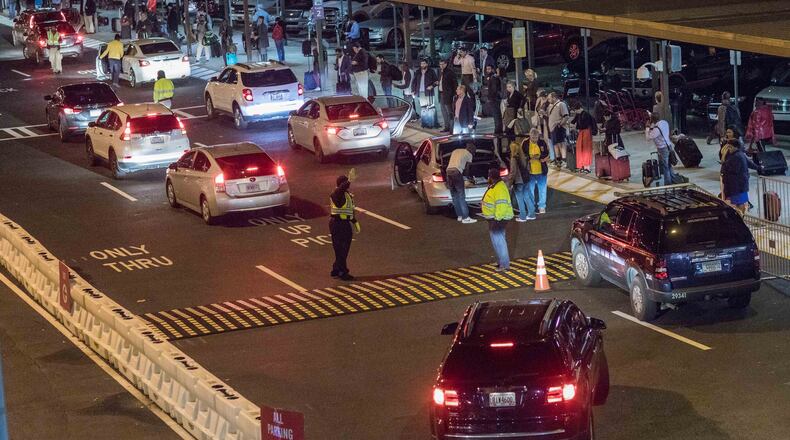Hartsfield-Jackson International for years has seen taxi traffic dwindle as more travelers use Uber and Lyft, and now the airport is seeing a decline in its parking revenue.
In the April-June quarter of 2019, the airport saw a more than $1 million drop in airport parking revenue compared with a year ago, equivalent to a decline of about 2.84 percent for the quarter.
It's a trend seen at other airports around the country over the past couple of years, and now parking revenue at the world's busiest airport is also beginning to decline.
“Our parking is being subjected to reductions in demand due to Uber and Lyft,” said Hartsfield-Jackson general manager John Selden at a meeting Wednesday of the Atlanta city council transportation committee, which oversees the airport.
Hartsfield-Jackson depends on parking revenue for a significant portion of its budget. More than a year ago, the airport brought in $147.6 million from parking for the fiscal year that ended in June 2018. That was up from 2017 fiscal year, reflecting an initial increase in revenue from higher parking rates that took effect in August 2017.
Since then, Uber and Lyft have continued to grow, with 746,990 pickups at the airport from April to June 2019.
During the same period, taxis at the airport had just 139,256 pickups.
Taxi traffic declined about 20 percent while Uber and Lyft pickups grew by 38.5 percent for the full fiscal year.
Long walk to Uber and Lyft
One of the biggest complaints among the growing number of travelers using Uber and Lyft is the long walk to the pickup areas near economy parking.
The Terminal North ride-share pickup area was moved in December to a location underneath the MARTA tracks. Getting to the Terminal South ride-share pickup area requires a longer walk through the parking deck.
“It seems like if that’s everyone’s biggest way of getting to the airport, they should have a better system,” said Atlanta traveler Noah Williams.
He said the walk can be uncomfortable particularly on hot summer days or when it’s freezing in the winter, and he compared it to the airport’s $265 million project to build curbside canopies and renovate the terminal facade and vestibules.
“If we could put that much attention into the canopy, we could put that much attention into making people’s walks shorter,” Williams said.
Stephanie Ogbogu, who travels to Atlanta frequently, said she tries to avoid getting picked up by Uber and Lyft at the domestic terminal because of the long walk.
“It’s so inconvenient,” she said. “I figure out ways to get around it.”
When Ogbogu is going on a short weekend trip, she tries to avoid checking bags so she can skip baggage claim and exit the airport through the international terminal, where Uber and Lyft can pickup curbside.
With the increasing popularity of Uber and Lyft, Atlanta city council member Amir Farokhi raised questions about “asking our patrons to walk a long way to jump on a ride-share” while the lesser-used taxi stand is right at the terminal curb.
Selden responded that the huge volume of passengers using Uber and Lyft is a key reason it’s difficult to locate the pickup areas close to the terminal.
“In certain hours, we’re having over 1,000 pickups,” Selden said. That would require 800 to 900 feet or more of curb space to handle, and the west curb where the taxi stand sits is not large enough, he said.
Selden said the airport is studying potential future locations for Uber and Lyft pickups, such as inside the parking decks, at the lower level curb or in a new ATL West parking deck under construction.
Dynamic pricing for airport parking
The airport’s overall revenue is up as it brings in more from other areas including concessions.
But with parking revenue making up such a large portion of the airport’s budget, Selden hopes to boost parking revenue through other strategies.
The airport plans to put in technological improvements at the new ATL West parking deck being built next to the Georgia International Convention Center, connected to the airport via the free SkyTrain.
The new parking deck, to be completed in June 2020, will allow people to use their Peach Pass, Selden said. It will also allow drivers, whose license plates are scanned at the entrance gate, to get a parking bill sent to them via mail -- for an extra fee. Such technological improvements could eventually be expanded to other airport parking locations.
Selden also wants to put in dynamic pricing at the ATL West deck. That means parking prices would be higher when demand is high and the garage is fuller. Such dynamic pricing would be similar to the system for express toll lanes, air fares, hotel room rates and other products and services.
“It’s really going to be a game changer for us,” Selden said.
Selden said travelers will be able to look at an app to see the parking rates and then determine where to park.
Some may instead choose airport park-ride lots that require a shuttle ride, private off-airport lots or other options.
About the Author
The Latest
Featured



